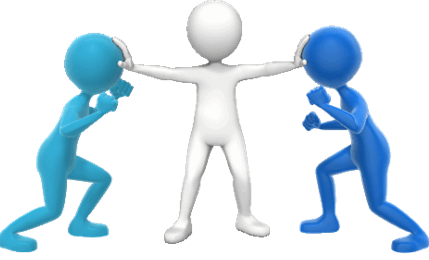Dealing with Conflict
Some performance issues can relate directly to conflict within a team and they may need to be dealt with on a bigger scale.
What are the signs of conflict within a team?
- Arguments
- Lack of motivation €“ fewer people volunteer to take on new tasks
- Unpleasant behaviour €“ people start to make derogatory remarks
- Failing productivity €“ likely to lead to more queries or complaints if people are not cooperating with each other
- Increased sick leave/absence €“ unhappiness may lead to depression or stress
- Increased level of grievances

True or False?
Conflict is inevitable
We are a diverse society and individual differences in ideas, interests, values, cultures and perceptions appear to make conflict inevitable. However, managed well, conflict does not have to be a negative or destructive experience.
Conflict can never lead to anything positive
This is something of a myth. Whilst it can be a risk, it can also lead to learning and growth. It can be a stimulus for new ideas and solutions. Effectively managed conflict can produce a win-win situation for all parties.
Conflicts are the results of clashing personalities
Personalities do not clash, behaviours do! Different people can work together for years without having conflict, until their behaviours conflict. Differentiating personality from behaviour makes conflict manageable.
Conflict and anger go together
Conflict with people does not necessarily have to include anger. There are a whole range of emotions that surface during conflict.
Does the leader often cause conflict?
Controversial! But sometimes the manager can encourage conflict if a goal is not made clear to the team or people are working towards different goals. If people are aligned to goals this can help avoid conflict in the first place.
